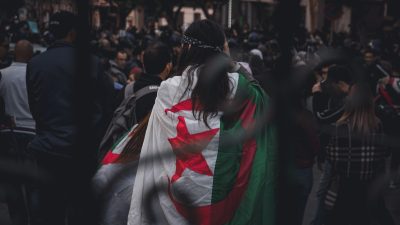1) Populist religion or religious populism?
Populist movements and parties show a growing tendency to resorting to religion as well as to using religious symbols and vocabulary. A growing body of sociological and politological literature (Zuquete 2017, Roy in Marzouki et al., 2016, Ozzano 2020) has explored how ethnocentric and xenophobic right-wing populist movements have appropriated archetypal religious symbols and vocabulary to construct a nativist and illiberal narrative. As it will be briefly discussed below, a wider range of disciplinary approaches has to be applied to the connection between populism and religion. Broadening the observation lens does not only help to better understand the populist phenomenon in itself, but sheds light on many unresolved contradictions of modern democracy.
Although by no means limited to that field, manipulation of religion is normally associated to right wing populism. In fact, religious signifiers have an essential role to play as identity markers in right-wing populist movements, as such movements construct the ‘people’ as a homogenous community that does not tolerate any internal pluralism (Urbinati 2014, p. 151). In the most decidedly ethno-centrist and nativist version of populism, religion undergoes the same process of naturalisation undergone by “culture”, whereby the latter has been reformulated in terms of a a–historical immutable and pristine form of identity. This process is by no means restricted to Christianity, as it is demonstrated by the Indian case.
Not surprisingly, in this kind of narrative references to religious values are accompanied by the attempt of reinforcing most traditional gender roles as well as securing males’ domination over women’s bodies. The Verona’s gathering of 2019 is certainly not an isolated case, but is part of a current that extends from the European Union to Russia and beyond the Atlantic (Mancini and Stoeckl, 2018). The most conservative expressions of the Roman Catholic church are obviously eager to endorse this identification of religion and culture, although, as briefly mentioned below, the relationship between Roman Catholicism and populism is extremely more complex. On the other hand, secularism itself may be appropriated, when swiftly identified as the sole province of “Western culture”, or manipulated as a marker of national identity as lately demonstrated by BJP discourse: needless to say, in most cases this appropriation of secularism is part of Islamophobic agendas. Populist discourse is thus articulated in a “triangle” identified by “contemporary liberal values; Christian norms and values; populist sovereigntist, anti-migrant, and anti-Islam stances” (Roy 2019). Although originally formulated à propos Europe, Roy’s point applies well beyond the old continent’s borders.
A less frequent approach aims at assessing the legitimacy of the definition of “religious populism” as well as its precise meaning. In fact, this lemma may refer to both the sacralisation of politics and politicisation of religion, two phenomena which, although distinct, often “intertwine and cross-pollinate” (Zuquete 2017, p. 446). In the latter case, the definition of ‘religious populism’ implies some kind of direct nexus between theological categories and populist political forms. Once more, this elective affinity manifest itself primarily, but not exclusively, on the right hand of the political spectrum; equally, it is not limited to Christianity, as demonstrated by the Indian case (Jaffrelot e Tillin 2017, Subramanian 2007) and by the newly developed field of studies on ‘Islamic populism’. This approach necessarily leads to investigate how profound is the affinity, or, in other words, how direct and binding may be the nexus connecting populist political discourse to actual theological frameworks. This course of analysis makes it necessary to engage with such a controversial category as Political theology. the term covers a wide range of meanings, from “civil religion” to the direct application of religious categories to the political sphere. Political theology may also indicate the mutual implication or mirroring between the theological-metaphysical categories on the one hand, and the categories political-institutional from the other (Rosito 2015, p. 17).
Elective affinities: redemption and community
The resonance of Christian theological categories with populism is a field still for the most part unexplored. Some possible directions of research are evident even to the most superficial glance, such as the eschatological-messianic and redemptive character of populist politics.
Populist obsession with purity deeply resonates with religious aspirations to salvation and liberation from sin, at least in their Christian version. Margaret Canovan has opened the way to the study of populism as a ‘politics of redemption’, moving from Oakeshott’s opposition between politics of scepticism and politics of faith (Canovan 1999), a dyad that could be integrated with the Weberian opposition between ethics of responsibility and ethics of intention. Whilst democratic representative institutions have to come to terms with the hard necessity of the exercise of power, populism thrives off the glorification “civil society” as the opposite to the cynical dimension of professional politics. Populism evokes the dream of a political agency that does not have to put up with the existential tragedy of ethics of responsibility; its rhetoric promises to eschew the painstaking and frustrating search for compromises and negotiations, such an important component in the very fabric of democratic politics.
The redemptive character of populist politics also presents many points of contact with an eschatological perspective. Traits such as the Manichean contrast between a pure ‘people’ and corrupt elites and ‘politicians’ or the continuous construction of the simplified and antagonistic “us” and “them” find an appropriate framework of reference in apocalyptic expectations of a final struggle of good and evil. Trump’s success in intercepting the paranoid sense of persecution typical of the new religious right can thus be explained; in more general terms, populism promises a sort of palingenetic restoration of justice and right.
Populist discourse undoubtedly operates an instrumental simplification of the terms of democratic representation, as well as a kind of banalization of expectations of transformation and renewal. On the other hand, Canovan’s lesson reminds how populism intercepts a deep-set knot of contradiction of modern democracy, to begin by the stark contrast between its promise of autonomy and enfranchisement and the reality of its being little more than a mechanism of élites’ selection. On an even deeper level, populism captures the profound aspiration towards radical, transformative political agency, which does not any more find a proper channel of expression in the context of late modern democratic politics.
Visible and invisible people
Equally, or perhaps even more, relevant is the debt of the populist notion of people as a source of legitimacy towards a political-theological perspective. This connection is all the ore worth exploring if considered in light of the specific nature of populism, that of being, in Urbinati’s word, the disfigured image of democracy. Insofar as it shares its roots with democracy, populism brings to light many of its contradictions, as briefly discussed above. But most of all, the study of the nexus connecting religion and populism helps to focus on the often-unacknowledged permanence of theological political elements in the very source of democratic legitimacy, identified with “the people”.
Democracy and populism both identify “popular sovereignty” as the source of democratic legitimacy; they part ways, as it is well known, when the matter at stake is identifying the contours of the political community supposedly entitled to exercise such sovereign power. A seminal contribution by Andrew Arato sets the framework for future research, retracing the steps leading from Rousseau and Schmitt to Laclau’s “’extrication’ of the people from its empirical connotation” (Arato 2016 p. 281) in order to reveal the transcendental legacy in the category of popular sovereignty. In his reconstruction, Arato highlights how important the reference to the dynamic between visible and invisible Church, typical of Christian ecclesiology, has been in identifying the source of legitimacy in the conception of “people” as a transcendental community.
Evidently, this observation calls for more genealogical work; in fact, a in – depth exploration in the field of Christian ecclesiology could help to explain at least in part the phenomenology of contemporary populism. To make but a few obvious references, the reference to the “people of God”, so central for Roman Catholic ecclesiology, could and should be further explored, especially in light of the most recent expressions of Pope Bergoglio’s theological views. As far as Protestantism is concerned, the alliance between right – wing populism and the ever changing and diverse “Evangelical” galaxy needs to be explored beyond the well-established and undoubtedly helpful sociological lens in order to explain. An in-depth theological work is needed in order to unravel the apparently inexplicable transformation of “democratic” ecclesiological expressions into strongholds of authoritarianism.
Evidently, explaining the connection between populism and religion solely in terms of “manipulation” is not up to the twofold task of deconstructing the populist distortion of democratic legitimacy and – most importantly – of investigating the similarities between democracy and its distorted face. The great challenge of democracy, as Claude Lefort reminds us (Lefort 2007) is to constitute itself around a ‘void’. Democratic political communities are often prone to the temptation to fill this empty centre by resorting to constricting a notion of sovereign people heavily dependent from a transcendental perspective. The void which Lefort identifies as democracy’s centre and point of origin democracy, however, is not the same as an absence, is not “lacking of something. This void is rather a meeting space, inhabited by a “people” considered as a work-in-progress (in Habermasian terms, fluidified”) rather than to supposedly “natural’ community. Designing the contours of this inclusive and pluralist political community is a task cannot be accomplished without confronting the unresolved contradictions of democratic politics. The complex legacy of political theology therefore cannot be simply removed or concealed; the exploration of the connection between populism and religion may prove to be an important step in this journey.
Bibliography
A. Arato, Political Theology, Populism, and the Constituent Power in Post Sovereign Constitution Making: Learning and Legitimacy Oxford University Press 2016 pp 269-298
C Jaffrelot, L. Tillin, Populism in India, Oxford Handbook of Populism 2017 DOI: 10.1093/oxfordhb/9780198803560.013.7
C. Lefort, Essais sur le politique. XIXe–XXe siècles, Paris, Éditions du Seuil, 1986.
N. Marzouki, D. McDonnell, O. Roy, Saving the People. How Populists Hijack Religion, Hurst, London 2016
S. Mancini, e K. Stoeckl, Transatlantic Conversations The Emergence of Society-Protective Antiabortion Arguments in the United States, Europe, and Russia (March 25, 2018), in S. Mancini, M. Rosenfeld, eds, The Conscience Wars. Rethinking the Balance between Religion, Identity, and Equality, Cambridge University Press, 2018. Available at SSRN: https://ssrn.com/abstract=3149132
L. Ozzano, The Masks of the Political God. Religion and political parties in contemporary democracies, ECPR Press, London, Rowman and Lyttlefield 2020
V. Rosito, La teologia politica contemporanea. Paradigmi autori, prospettive, Napoli, Studium 2015
O. Roy, Populism and Christianity: The Tale of Two Continents, https://berkleycenter.georgetown.edu/responses/populism-and-christianity-the-tale-of-two-continents
N. Subramanian, “Populism in India”, SAIS Review of International Affairs
Volume 27, Number 1, Winter-Spring 2007 , pp. 81-91
N. Urbinati, Democrazia sfigurata, il popolo fra opinione e verità, Università Bocconi Editrice, Milano 2014
M. Weber, Economia e Società, Ed. di Comunità, Milano 1961, 2 voll.
J. P. Zuquete, Populism and Religion, in The Oxford Handbook of Populism, C. Rovira Kaltwarsser, P. Taggart, P. Ochoa Espejo, and P. Ostiguy, eds., Oxford University Press 2017, DOI:10.1093/oxfordhb/9780198803560.013.22
Each Author is responsible for the content of the signed texts, which therefore do not necessarily represent opinions or convictions shared by the Publisher. Insubria University and Redesm research center are not responsible for the contents provided by the authors.










